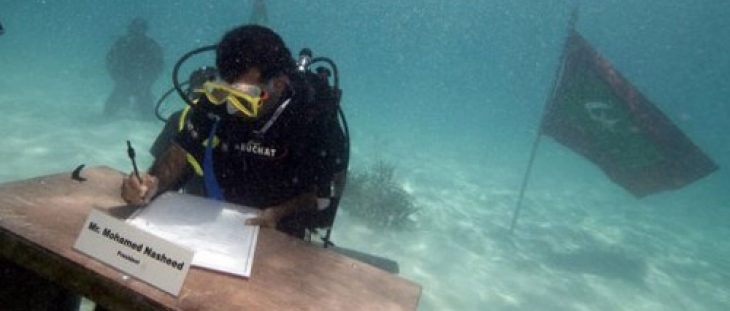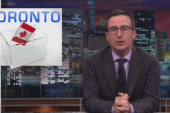
 The Island President Last weekend I found myself in a small room beneath the Hyatt with a diminutive head of state and a phalanx of g-men. It was a reception for a TIFF screening–a documentary about this man, of whom I’d never heard. Based on the polite round of applause, neither had many others. An hour later, at the film screening itself, the small President was ushered into the theatre and re-introduced–waving bemusedly, dwarfed by the big room. Again, there was polite applause. The host, in his introductory remarks, told us that if we hadn’t heard much about this man, that would change soon. Then the film began. Mohamed Nasheed, we learned, was once a young writer, imprisoned in solitary confinement in a corrugated shed in The Maldives, a chain of 2,000 staggeringly beautiful low-lying islands south of India, with a population that’s smaller than Halifax. Nasheed went from tortured prisoner to charismatic opposition leader and, eventually, the country’s first democratically elected president. That small matter being accomplished, a new challenge awaited: His country is literally being engulfed by the rising sea. The Maldives are so close to sea-level that even small changes to climate patterns wash away its land. The president of a tiny island state is not dealt a strong hand. Nasheed had no power but moral authority, a charming persuasive nature, and a knack for cunning publicity coups. On these strengths, he took his country’s plight around the world in the run-up to the 2009 climate talks in Copenhagen, organizing alliances, playing world powers off against each other, struggling for action. The film, The Island President, follows Nasheed for a year, from Mal to London to New York, providing a fascinating peek into the world of backroom diplomacy, and the effect that force of character can have there. He became a folk hero to the climate-change movement, and eventually wedged himself between countries like India, Australia, the United States and China, which we learn wanted the talks to collapse without any agreement whatsoever. In the end, the fact that any diluted statement of agreement at all was released in Copenhagen can be traced, in part, to his activism. At the TIFF Lightbox, the film ended, and the president was introduced for a third time. The crowd who had given him a polite smattering of applause earlier, leapt to its feet and roared. So here was this guy, in Toronto. Outside the theatre, the city was busy performing another stunt of rectal-cranial inversion. One of the upsides of Rob Ford’s Toronto is that the city discovers a new and interesting way of achieving this every day. That weekend, the news was full of chatter about how Denzil Minnan-Wong, one of the mayor’s closest allies, wanted to tear down a heavily-used crosswalk because it was causing drivers a few minutes’ delay. It’s hard to welcome global-thinking leaders to this city without thinking of the irony of context. Inside the theatre, the President of the Maldives spoke to the crowd about how he was playing a long game with limited resources to save his country from destruction at the hands of climate change. Outside the theatre, a city with ten times the population of the Maldives was preparing to completely gut its environmental initiatives. Inside the theatre, a man returned to his home country from exile to face the possibility of torture and lead a democracy movement for his people. Outside, a city was about to chop a swath of services for its most needy to pay for a $60 tax cut for drivers and a one-year property tax freeze for the rest. It’s amazing, in a year, how our horizons have shrunk. Spooked by the success of Ford’s populist campaign, even progressives played along with the idea that there are no citizens, only taxpayers. I can hear it in my own conversations, in which, trying to meet the Ford Nation on its own terms, the service-for-tax argument has become the only argument. The last administration had global aspirations. This can be a tough sell at the municipal level. People chiefly think of municipal governments as service-delivery organizations, and not without cause, and its easy for ambitious governments to find themselves in a place where civic aspiration becomes disconnected from service return. That’s when the Rob Fords of the world get elected. Rob Ford didn’t sell the city on a platform–anyone paying attention knew his platform didn’t add up–but on an attitude: All this high-minded stuff is tiring; let’s look out for number 1 for a bit. It was appealing. Now, the city’s been dragged into a navel-gazing catatonic state, in which there is only one civic virtue worth discussing: comfort. The battlefields that the Fords have chosen haven’t been issues that would really affect the quality of life for any swath of the population. Instead, the city’s fixation is on eliminating things that irritate the comfortable. Slight traffic delays, like the ones caused by bike lanes on Jarvis and pedestrian crossings on Yonge, irritate the comfortable. Small taxes, like the vehicle registration tax, irritate the comfortable. Property tax hikes that match inflation irritate the comfortable. The cuts the city now faces merely pay for those property tax hikes and freezes: As Matt Elliott has pointed out, the cuts that are being mooted now barely save more money than was lost by the tax cut and freeze. The charade of filling the trumped-up budget gap is just that. And those cuts barely affect the middle-class directly: They target things like child-care and affordable housing. And staunch Ford ally David Shiner is refusing to support the one item that might actually irritate the comfortable: cuts to clearing snow from driveways after the plough’s been by. (Note to self: Ten paragraphs ago, I was talking about human rights.) None of this is to knock comfort, nor the comfortable. I’m pretty comfortable, and I like it that way. In fact, I think this government sells the comfortable short: Canadians are pretty good at being both comfortable and civic at the same time. It’s how we got to where we are. We are going through a period of governance by pandering, that asks people to dispose of their responsibilities as citizens, think hard about what really, really bugs you (it’s graffiti, right?), then get Rob Ford on the phone to fix it at the expense of the vulnerable. Sometimes it takes a visit from the outside world to put things into perspective. Just because Toronto has shelved a set of ideas–citizenship, leadership, ambition, social responsibility–doesn’t mean they’ve ceased to exist. They’ll find their voice again. In the meantime, figures like Mohamed Nasheed remind us that there’s a world beyond comfort, and a world beyond this city. Of course, there was another item in the news that weekend: The city is going to cut funding to the festival that brought him here. __ Ivor Tossell is a Senior Editor at Toronto Standard and writes Urban Studies, a weekly column on municipal affairs.
The Island President Last weekend I found myself in a small room beneath the Hyatt with a diminutive head of state and a phalanx of g-men. It was a reception for a TIFF screening–a documentary about this man, of whom I’d never heard. Based on the polite round of applause, neither had many others. An hour later, at the film screening itself, the small President was ushered into the theatre and re-introduced–waving bemusedly, dwarfed by the big room. Again, there was polite applause. The host, in his introductory remarks, told us that if we hadn’t heard much about this man, that would change soon. Then the film began. Mohamed Nasheed, we learned, was once a young writer, imprisoned in solitary confinement in a corrugated shed in The Maldives, a chain of 2,000 staggeringly beautiful low-lying islands south of India, with a population that’s smaller than Halifax. Nasheed went from tortured prisoner to charismatic opposition leader and, eventually, the country’s first democratically elected president. That small matter being accomplished, a new challenge awaited: His country is literally being engulfed by the rising sea. The Maldives are so close to sea-level that even small changes to climate patterns wash away its land. The president of a tiny island state is not dealt a strong hand. Nasheed had no power but moral authority, a charming persuasive nature, and a knack for cunning publicity coups. On these strengths, he took his country’s plight around the world in the run-up to the 2009 climate talks in Copenhagen, organizing alliances, playing world powers off against each other, struggling for action. The film, The Island President, follows Nasheed for a year, from Mal to London to New York, providing a fascinating peek into the world of backroom diplomacy, and the effect that force of character can have there. He became a folk hero to the climate-change movement, and eventually wedged himself between countries like India, Australia, the United States and China, which we learn wanted the talks to collapse without any agreement whatsoever. In the end, the fact that any diluted statement of agreement at all was released in Copenhagen can be traced, in part, to his activism. At the TIFF Lightbox, the film ended, and the president was introduced for a third time. The crowd who had given him a polite smattering of applause earlier, leapt to its feet and roared. So here was this guy, in Toronto. Outside the theatre, the city was busy performing another stunt of rectal-cranial inversion. One of the upsides of Rob Ford’s Toronto is that the city discovers a new and interesting way of achieving this every day. That weekend, the news was full of chatter about how Denzil Minnan-Wong, one of the mayor’s closest allies, wanted to tear down a heavily-used crosswalk because it was causing drivers a few minutes’ delay. It’s hard to welcome global-thinking leaders to this city without thinking of the irony of context. Inside the theatre, the President of the Maldives spoke to the crowd about how he was playing a long game with limited resources to save his country from destruction at the hands of climate change. Outside the theatre, a city with ten times the population of the Maldives was preparing to completely gut its environmental initiatives. Inside the theatre, a man returned to his home country from exile to face the possibility of torture and lead a democracy movement for his people. Outside, a city was about to chop a swath of services for its most needy to pay for a $60 tax cut for drivers and a one-year property tax freeze for the rest. It’s amazing, in a year, how our horizons have shrunk. Spooked by the success of Ford’s populist campaign, even progressives played along with the idea that there are no citizens, only taxpayers. I can hear it in my own conversations, in which, trying to meet the Ford Nation on its own terms, the service-for-tax argument has become the only argument. The last administration had global aspirations. This can be a tough sell at the municipal level. People chiefly think of municipal governments as service-delivery organizations, and not without cause, and its easy for ambitious governments to find themselves in a place where civic aspiration becomes disconnected from service return. That’s when the Rob Fords of the world get elected. Rob Ford didn’t sell the city on a platform–anyone paying attention knew his platform didn’t add up–but on an attitude: All this high-minded stuff is tiring; let’s look out for number 1 for a bit. It was appealing. Now, the city’s been dragged into a navel-gazing catatonic state, in which there is only one civic virtue worth discussing: comfort. The battlefields that the Fords have chosen haven’t been issues that would really affect the quality of life for any swath of the population. Instead, the city’s fixation is on eliminating things that irritate the comfortable. Slight traffic delays, like the ones caused by bike lanes on Jarvis and pedestrian crossings on Yonge, irritate the comfortable. Small taxes, like the vehicle registration tax, irritate the comfortable. Property tax hikes that match inflation irritate the comfortable. The cuts the city now faces merely pay for those property tax hikes and freezes: As Matt Elliott has pointed out, the cuts that are being mooted now barely save more money than was lost by the tax cut and freeze. The charade of filling the trumped-up budget gap is just that. And those cuts barely affect the middle-class directly: They target things like child-care and affordable housing. And staunch Ford ally David Shiner is refusing to support the one item that might actually irritate the comfortable: cuts to clearing snow from driveways after the plough’s been by. (Note to self: Ten paragraphs ago, I was talking about human rights.) None of this is to knock comfort, nor the comfortable. I’m pretty comfortable, and I like it that way. In fact, I think this government sells the comfortable short: Canadians are pretty good at being both comfortable and civic at the same time. It’s how we got to where we are. We are going through a period of governance by pandering, that asks people to dispose of their responsibilities as citizens, think hard about what really, really bugs you (it’s graffiti, right?), then get Rob Ford on the phone to fix it at the expense of the vulnerable. Sometimes it takes a visit from the outside world to put things into perspective. Just because Toronto has shelved a set of ideas–citizenship, leadership, ambition, social responsibility–doesn’t mean they’ve ceased to exist. They’ll find their voice again. In the meantime, figures like Mohamed Nasheed remind us that there’s a world beyond comfort, and a world beyond this city. Of course, there was another item in the news that weekend: The city is going to cut funding to the festival that brought him here. __ Ivor Tossell is a Senior Editor at Toronto Standard and writes Urban Studies, a weekly column on municipal affairs.














